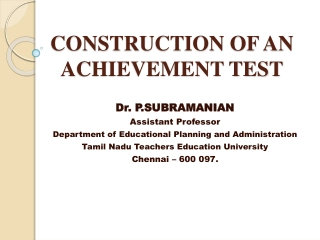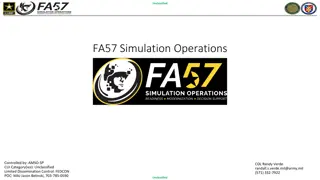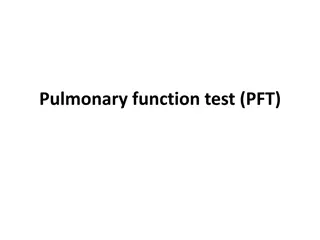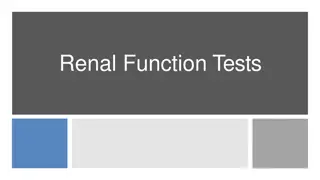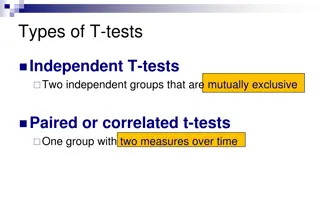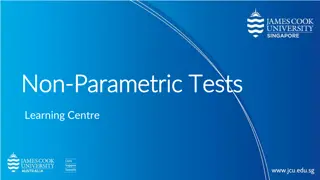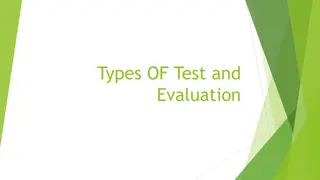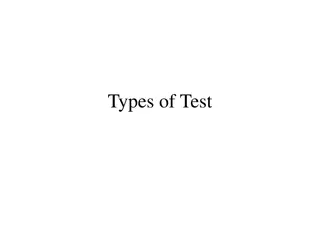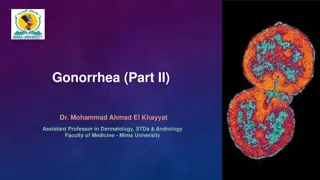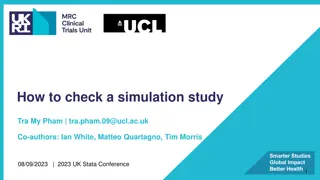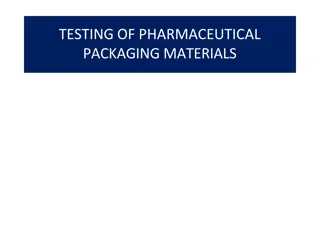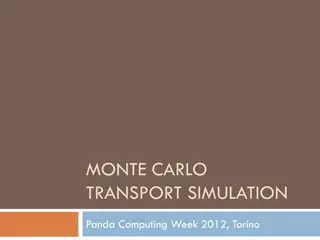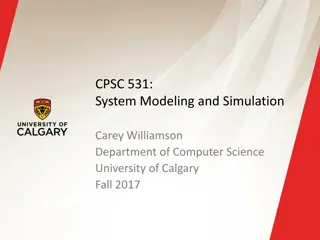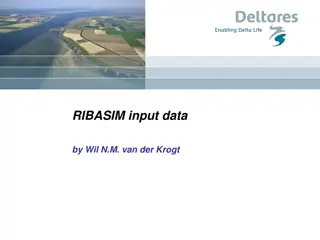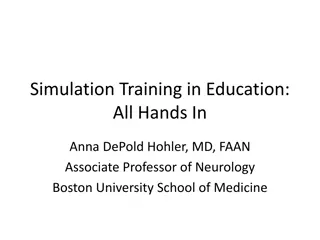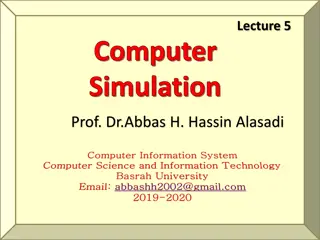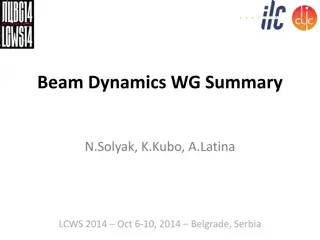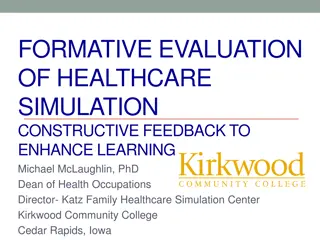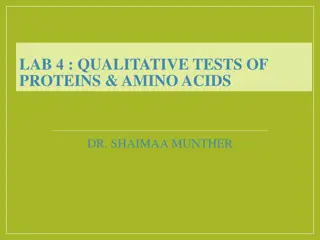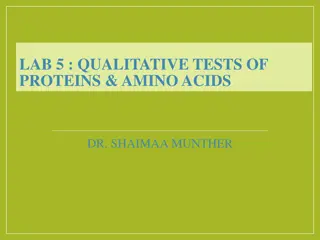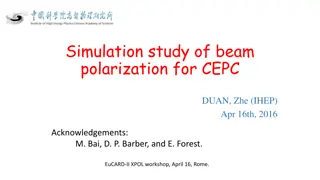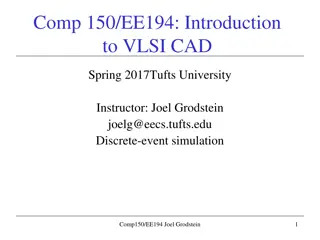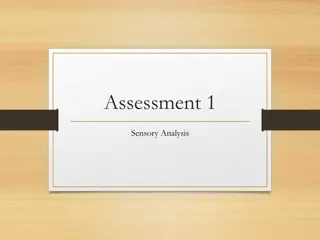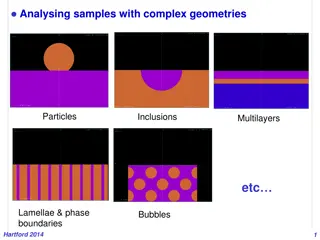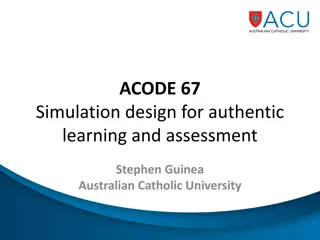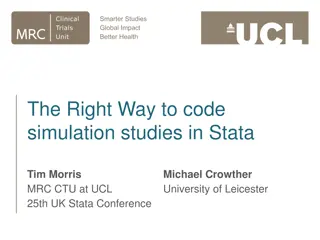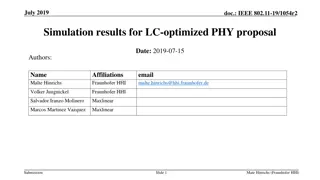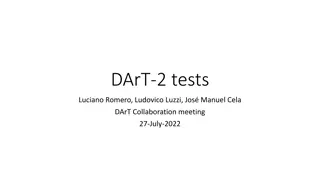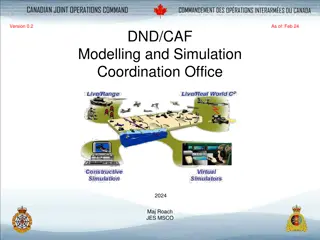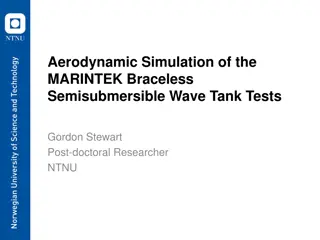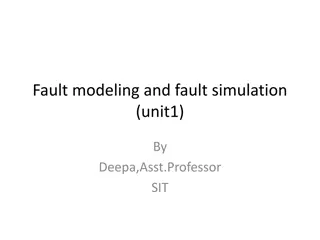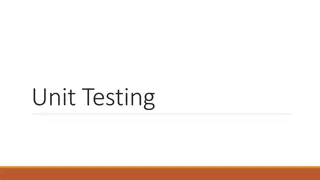Construction of an Achievement Test
Learn about achievement tests, standardized tests, oral tests, essay tests, and more for student evaluation. This guide discusses various types of tests and their purposes in assessing student learning. Enhance your understanding of educational assessment methods with this comprehensive resource
0 views • 29 slides
System Modeling and Simulation Course Overview
This course covers the basics of systems modeling, discrete-event simulation, and computer systems performance evaluation. Topics include Monte Carlo simulation, probability models, simulation output analysis, queueing theory, and more. Professor Carey Williamson leads the course with a focus on pra
4 views • 21 slides
Overview of Army Modeling and Simulation Office
The U.S. Army Modeling and Simulation Office (AMSO) serves as the lead activity in developing strategy and policy for the Army Modeling and Simulation Enterprise. It focuses on effective governance, resource management, coordination across various community areas, and training the Army Analysis, Mod
1 views • 8 slides
Comprehensive Overview of Pulmonary Function Tests (PFTs)
Pulmonary Function Tests (PFTs) are vital for assessing pulmonary gas exchange through ventilation, diffusion, and lung perfusion. These tests include measurements of lung volume, airway patency, gas exchange efficacy, and pulmonary blood flow. PFTs offer benefits in diagnosing dyspnea, monitoring d
0 views • 14 slides
Understanding Verbal and Non-Verbal Tests
Verbal and non-verbal tests serve different purposes in assessing intelligence and skills. Non-verbal tests utilize images and diagrams to measure reasoning abilities without requiring reading or writing. Verbal tests, on the other hand, assess language-based skills through reading, writing, or oral
0 views • 14 slides
Understanding Renal Function Tests and Kidney Health
Renal function tests are essential for diagnosing and monitoring kidney health. These tests assess functions like glomerular filtration, tubular reabsorption, and endocrine functions of the kidneys. Common indicators include serum urea, creatinine levels, and more. It's crucial to evaluate renal fun
0 views • 34 slides
Understanding Different Types of T-Tests in Psychological Research
This article provides an overview of different types of t-tests used in psychological research, including independent t-tests for comparing two groups, paired or correlated t-tests for within-group comparisons, and the assumptions behind conducting these tests. It also includes examples of when to u
1 views • 7 slides
Understanding Non-Parametric Tests and Their Applications
Non-parametric tests serve as valuable alternatives to parametric tests when data do not meet specific criteria. This article explores the concept of non-parametric tests, types of non-parametric tests, and provides insights on conducting the Mann-Whitney U Test using SPSS for practical research app
4 views • 32 slides
Understanding Types of Test and Evaluation in Education
Explore the various types of tests used in education, including pre-tests, mastery tests, and diagnostic tests. Learn about different mediums for testing, such as oral, written, and performance tests. Discover the role of examinees in essay-type and objective-type tests. Lastly, delve into different
1 views • 13 slides
Understanding Achievement and Aptitude Tests in Education
Explore the differences between achievement and aptitude tests, such as how they measure abilities and knowledge. Learn about teacher-made tests, standardized tests, low-stake, and high-stake tests. Discover the importance of achievement tests in evaluating present proficiency and aptitude tests in
1 views • 16 slides
Gonorrhea Diagnostic Methods and Tests Overview
Dr. Mohammad Ahmad El Khayyat, an Assistant Professor in Dermatology, STDs, and Andrology, details the diagnostic methods and tests for gonorrhea. Various tests including Gram stain, culture, antigen detection tests, and nucleic acid amplification tests are discussed, highlighting sensitivity and sp
1 views • 30 slides
Understanding Achievement Tests in Education
Achievement tests play a crucial role in assessing student progress in schools, aiding curriculum planning, and evaluating teaching programs. These tests measure individual accomplishments after a period of learning, helping to determine the effectiveness of instruction. Characteristics such as reli
2 views • 30 slides
Integrated Language Tests and Assessments Overview
This content delves into integrated language tests and assessments, exploring the differences between separate skills tests and integrated tests. It covers the rationale behind integrating language skills, examples of integrated skills tests, as well as shortcomings to avoid in test design. Key aspe
1 views • 35 slides
How to Check a Simulation Study: Methods and Considerations
Simulation studies are often used to evaluate statistical methods and study power, but they can sometimes produce misleading results. This work discusses strategies to assess and improve the quality of simulation studies, drawing on experiences and considerations outlined in relevant literature. A s
0 views • 31 slides
Quality Control Tests for Pharmaceutical Packaging Materials
This article discusses quality control tests for pharmaceutical packaging materials focusing on glass containers. The tests include chemical resistant tests such as powdered glass test and water attack test, as well as hydrolytic resistance tests. Detailed procedures for each test are outlined along
3 views • 18 slides
Understanding Monte Carlo Transport Simulation
Monte Carlo simulation is a stochastic technique that uses random numbers and probability statistics to investigate and solve problems. In the context of transport simulation, a Monte Carlo program simulates the passage of particles through matter, involving geometry, transport, visualization, detec
0 views • 11 slides
System Modeling and Simulation Overview
This content provides insights into CPSC 531: System Modeling and Simulation course, covering topics such as performance evaluation, simulation modeling, and terminology in system modeling. It emphasizes the importance of developing simulation programs, advantages of simulation, and key concepts lik
0 views • 28 slides
Basin Manipulation Simulation Analysis Tool Overview
Basin Manipulation Simulation Analysis Tool provides a comprehensive solution for managing and analyzing basin data, including tasks like basin manipulation, simulation analysis, case management, and defining simulation time steps. The tool allows for easy data entry, visualization of simulation res
2 views • 17 slides
Simulation Training in Education: Enhancing Learning Through Hands-On Simulation
Hands-on simulation training in education provides students with valuable learning experiences by increasing self-reported knowledge and technical proficiency. Simulations help improve students' knowledge, experience, and comfort with challenging procedures in a lower-risk environment, leading to en
0 views • 13 slides
Understanding Computer Simulation and Modeling Tools
Computer simulation and modeling is essential for conducting studies in various fields. Selecting the right simulation language or package is crucial for accurate results. This involves considering the characteristics of the language, such as random number generation, process transformers, list proc
0 views • 7 slides
Advanced Beam Dynamics and Machine Protection in High-Energy Linacs
Overview of recent talks and discussions at LCWS 2014 in Belgrade, Serbia, focusing on machine protection, simulation codes, instrumentation, and system tests. Topics include beam-loss monitors, dark current measurements, simulation code developments, and beam dynamics studies in linacs. Key speaker
0 views • 12 slides
Enhancing Healthcare Simulation Through Constructive Feedback
Explore the principles and benefits of healthcare simulation, focusing on formative evaluation and constructive feedback to improve learning outcomes. Delve into the role of formative assessment tools, TeamSTEPPS model, and Mayo High Performance Teamwork Scale in simulation scenarios. Discover the s
0 views • 37 slides
Qualitative Tests of Proteins & Amino Acids: Overview and Analysis
In this lab, you will delve into the qualitative tests for proteins and amino acids, understanding their structures, classifications, and importance in food and human nutrition. The tests include solubility tests and identification tests for both amino acids and proteins, revealing their presence an
0 views • 13 slides
Qualitative Tests of Proteins & Amino Acids - Lab Analysis Overview
This lab analysis covers qualitative tests for proteins and amino acids, including solubility tests and identification tests for amino acids and proteins. Specific tests like Ninhydrin test for -L amino acids, Xanthoproteic test for aromatic amino acids, and lead sulfite test for sulfhydryl group de
0 views • 13 slides
Beam Polarization Simulation Study for CEPC
Simulation study on beam polarization for the Circular Electron Positron Collider (CEPC) using the PTC Poly- morphic Tracking Code. The study includes orbital and spin tracking, equilibrium polarization calculation, and Monte-Carlo simulation of depolarization rate. Comparison with other Monte-Carlo
0 views • 20 slides
Introduction to VLSI CAD and Discrete-Event Simulation at Tufts University
This course introduces students to event-oriented simulation, building virtual models, and validating designs through simulation. It covers the importance of simulation in testing and refining designs before implementation. Examples include simulating VLSI networks and exploring the use of discrete-
0 views • 32 slides
Sensory Analysis Tests in Food Evaluation
Explore different sensory analysis tests used in food evaluation, including paired comparison tests for sweetness, quantitative descriptive analysis for taste attributes, and affective tests like hedonic tests. Understand the purpose and methodology of each test to enhance product development and qu
0 views • 12 slides
Advanced Simulation Techniques for Analyzing Samples with Complex Geometries
Explore the capabilities of PENELOPE simulation software for analyzing samples with intricate structures like particles, inclusions, multilayers, lamellae, and phase boundaries. The software facilitates detailed investigations of material composition and electron-photon transport in diverse geometri
0 views • 28 slides
Simulation Design for Authentic Learning and Assessment at ACU
Simulation design for authentic learning and assessment is a crucial aspect of education, particularly in the healthcare field. At the Australian Catholic University (ACU), simulation plays a significant role in providing students with authentic experiences that bridge the gap between theory and pra
0 views • 18 slides
The Right Way to Code Simulation Studies in Stata
Simulation studies in Stata involve using (pseudo) random numbers to generate data from a distribution for studying statistical methods. This process helps to evaluate different scenarios and understand the properties of statistical techniques. Key components like ADEMP (Aims, Data-generating mechan
0 views • 18 slides
Simulation Results for LC-Optimized PHY Proposal in July 2019
The document presents simulation results for an LC-optimized PHY proposal for TGbb based on G.9991 PHY. It includes details on the simulation setup, frame detection results, header modulation, coding simulation results, payload modulation, and coding simulation results. The setup involved various re
0 views • 18 slides
Thermoelectric Module with PID Control Simulation
This simulation showcases a lumped thermoelectric module with PID control. The model evaluates the performance of a thermoelectric element in a nonisothermal fluid flow around a heat sink. A stationary simulation assesses the module's capabilities, followed by a transient simulation with a PID contr
0 views • 7 slides
DArT-2 Tests and Experiments Overview
The DArT-2 tests involve twin experiments - DArT-2 and DArT-Test, focusing on ensuring the performance of DArT-2 in studying underground argon. Various tests like electronic tests of the PDM and vacuum tests are conducted to guarantee proper operation. Challenges with vacuum sealing and solutions li
0 views • 8 slides
Understanding the Differences Between Objective and Projective Tests
Objective tests aim to maximize objectivity by providing structured response options, while projective tests delve into hidden emotions and conflicts through ambiguous stimuli. Pros of objective tests include standardization and reliability, but projective tests offer unique insights based on indivi
0 views • 10 slides
Defense Modeling and Simulation Coordination Office Overview
The Defense Modeling and Simulation Coordination Office (DND/CAF MSCO) is responsible for managing contractors, policies, and strategic activities related to modeling and simulation within the Canadian Armed Forces. The office focuses on supporting various organizations and enhancing capabilities th
0 views • 6 slides
Aerodynamic Simulation of MARINTEK Braceless Semisubmersible: Insights and Tools
Explore the aerodynamic simulation of the MARINTEK Braceless Semisubmersible through advanced techniques and tools. Discover the unique aerodynamic actuator, simulation models, and tools used in the research conducted by Gordon Stewart, a post-doctoral researcher at NTNU. Gain insights into the expe
0 views • 16 slides
Comprehensive Overview of Fault Modeling and Fault Simulation in VLSI
Explore the intricacies of fault modeling and fault simulation in VLSI design, covering topics such as testing philosophy, role of testing in VLSI, technology trends affecting testing, fault types, fault equivalence, dominance, collapsing, and simulation methods. Understand the importance of testing
0 views • 59 slides
Understanding Unit Testing in Software Engineering
Concept Software is a discipline comprising various code pieces. Testing these codes together is complex but vital in Software Engineering. The process includes early testing like unit tests, pairwise/multiple component testing, module testing, integration testing, user tests, alpha tests, beta test
1 views • 6 slides
Simulation-Based Tests for Comparing Multiple Means
Simulation-based tests provide a method for comparing multiple means by assuming no association between explanatory and response variables. Null distributions are created by shuffling data and calculating differences in means. The observed differences in sample means are then compared to the null di
0 views • 45 slides
Understanding Simulation Types for Ecosystem Modeling
Exploring different simulation types such as continuous and discrete event simulations for modeling complex systems like ecosystems. Detailed discussion on creating an ecosystem simulation with fish and bears on a grid, showcasing actions like breeding, moving, eating, and dying. Overview of a World
0 views • 31 slides
